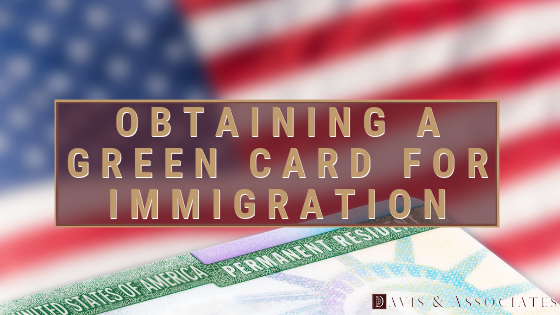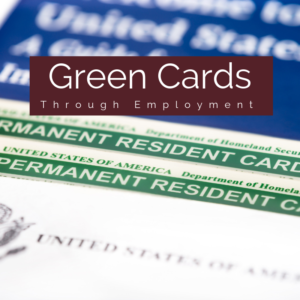
Everything You Need to Know About Obtaining a Green Card for Immigration
If you’re like many people, you want to get a green card or a permanent resident card to the U.S. – but how do you get one, where do you apply, and what else do you need to know?
What is a Green Card for Immigration, or Permanent Resident Card?
A green card, which is technically known as a permanent resident card, allows you to live and work permanently in the United States.
What’s the Difference Between a Green Card and a Visa?
A green card or permanent resident card is different from a visa because it provides permanent authorization to live and work in the U.S. You need to renew your green card every 10 years, but you don’t need to re-prove your eligibility for permanent residency here; it’s mostly about getting a new card. The permanent residency card is called a green card because it’s a green, plastic-coated photo ID card that you get from the government when you’re given permanent residency.
A visa comes from the U.S. Department of State and allows someone to present him- or herself at the border and enter the United States for a temporary stay. Usually, all a visa shows up as is a stamp in a passport. The one exception is an immigrant visa, which allows a person to become a permanent resident as soon as he or she arrives in the U.S.
Who’s Eligible for a Green Card?
There are several eligibility categories for green cards. You may be eligible for a green card through:
- Family connections
- Employment
- Refugee or asylee status
You might also be eligible if you were a victim of human trafficking, crime or abuse.
Permanent Resident Cards for Spouses, Future Spouses and Relatives
If you’re the immediate relative of a U.S. citizen, such as a spouse, an unmarried child who’s under the age of 21, or a parent (provided that the U.S. citizen is at least 21 years old), you could be eligible to apply for a permanent resident card.
You may also be eligible to apply for a permanent resident card under a family-based preference category if you’re:
- Older than 21 and the unmarried child of a U.S. citizen
- A married child of a U.S. citizen or green card holder
- Sibling of a U.S. citizen who’s at least 21 years old
Spouses or unmarried children of a lawful permanent resident who isn’t an American citizen may also be eligible to apply for a green card.
[youtube https://www.youtube.com/watch?v=3wRwAPQFRmc]
Fiancés of U.S. Citizens
If you intend to marry a U.S. citizen, you could be eligible to apply for a K-1 nonimmigrant visa; once you’re married, you can apply to change your status and become a lawful permanent resident.
Widows and Widowers
If you were married to a U.S. citizen at the time of his or her death, you can apply for a permanent resident card.
Abused Spouses, Children and Parents
The abused spouse or child of a citizen or lawful permanent resident can apply for a green card, and so can an abused parent of a U.S. citizen.
Green Cards Through Employment
Several categories of workers are eligible to apply for a permanent resident card in the U.S. Typically, you come in with a visa that’s specifically related to your type of work; from there, you may apply to change your status and become a permanent resident. There are three general types of green card eligibility through employment:
- Immigrant workers
- Physicians in underserved areas
- Immigrant investors
Immigrant Workers
USCIS categorizes immigrant workers by three levels of preference when it comes to green cards for immigration:
First-preference immigrant workers are:
- Recognized for “extraordinary ability” in business, athletics, education, sciences or the arts
- Considered outstanding researchers or professors
- Multinational managers or executives
Second-preference immigrant workers are:
- Working in professions that require advanced degrees
- Known for their exceptional ability in business, the arts or science
- Looking for a National Interest Waiver
Third-preference immigrant workers are:
- Skilled workers in fields that require a minimum of 2 years of training or work experience
- Professionals in fields that require at least a bachelor’s degree (or its foreign equivalent)
- Unskilled workers who perform a type of labor that requires fewer than 2 years of training or experience
Physician National Interest Waiver
If you’re a physician who agrees to devote full-time work in a clinical practice that’s in a designated underserved area, and if you meet other eligibility requirements, you may be eligible to apply for a green card after obtaining a work visa.
Immigrant Investors
Immigrant investors must agree to invest at least $1 million (or $500,000 in a “Targeted Employment Area” or rural area) in what’s considered a new commercial enterprise to create or maintain full-time positions for at least ten qualifying employees.
A new commercial enterprise is a business or organization that was created after November 29, 1990 or one that was restructured significantly since that date.
Special Immigrants
Some people fall under the special immigrant category. If you do, you can apply for a visa and adjust your residency status once you have met the right requirements. Special immigrants for green cards include:
- Religious workers who are coming to the U.S. to work for a nonprofit religious organization
- Special immigrant juveniles, who are children who have been abused, abandoned or neglected by a parent and who have SIJ status
- Afghanistan or Iraq nationals who served as translators for the U.S. government; were employed by or for the U.S. government in Iraq on or after March 20, 2003, and for at least a year; or were an Afghan employed by the International Security Assistance Force
- Employees of international organizations or NATO-6 employees or their family members, including retirees of these organizations
Green Cards for Refugees and Asylees
People who were granted asylum status or those who were admitted as a refugee at least a year can apply to adjust their status to become lawful permanent residents in the U.S.
If you are an asylee, you must:
- Be present in the U.S. when you file your Form I-485 to adjust your status and have been present in the U.S. for at least a year after you were granted asylum
- Continue to meet the definition of an asylee (or you must be the spouse or child of an asylee)
- Have not firmly resettled in another country
- Meet criteria that other green card applicants must meet
If you are a refugee, you must:
- Have come into the U.S. as a refugee
- Be present in the U.S. when you file your Form I-485 to adjust your status, and have been present in the U.S. for at least a year after you were admitted
- Still have your refugee status
- Meet criteria that other green card applicants must meet
Human Trafficking, Crime or Abuse Victims
People who have T or U nonimmigrant visas – those who were admitted to the U.S. as human trafficking victims or crime victims – may be eligible to adjust their status and become lawful permanent residents.
If you have a T nonimmigrant visa, you must be admissible to the United States and you must comply with reasonable requests from law enforcement in the investigation or prosecution of human trafficking (unless you’re under the age of 18).
If you have a U nonimmigrant visa, you must be admissible to the U.S. and you must provide information that you have regarding the criminal activity (unless you’re under 16, in which case a parent, guardian or “next friend” can provide information on your behalf).
Victims of abuse – those who are abused spouses or children of U.S. citizens or green card holders, or who are abused parents of U.S. citizens – can also apply for a change of status in their visas to become lawful permanent residents themselves.
Other Categories for Permanent Residency
If you hold a visa in one of the following categories, you could be eligible to change your status and become a green card holder:
- Cuban Adjustment Act
- Dependent status under the Haitian Refugee Immigration Fairness Act
- Lautenberg parolee
- Indochinese Parole Adjustment Act of 2000
- American Indian born in Canada
- A person born in the U.S. to a foreign diplomat
- Section 13 (diplomat)
Green Card Lottery Program: The Diversity Immigrant Visa Program
The Diversity Immigrant Visa Program, or DV Program, is a lottery from which up to 50,000 people are chosen. Typically, the random selection involves individuals from countries with low immigration rates. If you have one of those visas, you can petition the government to update your status to permanent residency once you’ve met the requirements.
Rights and Responsibilities for People With A Permanent Resident Card
As a permanent resident of the U.S., you have certain rights and responsibilities. Your rights include:
- The right to stay in the U.S. indefinitely, as long as you don’t commit any crimes or other actions that make you removable (deportable) under immigration law
- The right to work in the U.S.
- The right to be protected by all local, state and federal laws
Your responsibilities include duties to:
- Obey all local, state and federal laws
- File tax returns and report your income accurately
- Support the democratic form of government
- Register with the Selective Service if you’re a male aged 18 to 25
Do You Need to Talk to a Green Card and Immigration Lawyer?
If you need to talk to a green card and immigration attorney, we may be able to help you. Call us at 713-965-6772 to schedule a free consultation with an immigration lawyer right now.
About Davis & Associates:
Davis & Associates is the immigration law firm of choice in Houston and surrounding areas. Their attorneys provide expert legal counsel for all aspects of immigration law, including deportation defense, writs of habeas corpus and mandamus, family-sponsored immigration, employment-sponsored immigration, investment immigration, employer compliance, temporary visas for work and college, permanent residence, naturalization, consular visa processing, waivers, and appeals. Attorney Garry L. Davis is Board Certified in Immigration and Nationality Law by the Texas Board of Legal Specialization.
Contact Info:
Davis & Associates
Address: 654 North Sam Houston Pkwy E #100, Houston, TX 77060
Phone: (832) 742-0444
